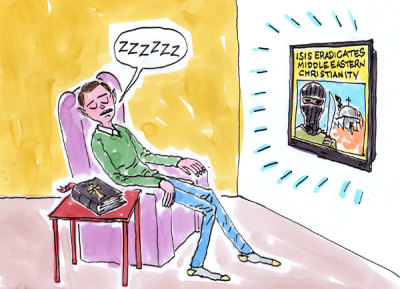What Pastors Should Say About ISIS

Speaking to a congregation about the ugly conflicts that plague our world is a challenging task for any pastor. But he is called to search the Scriptures and guide the flock entrusted to him by God in all matters of life.
One such challenging topic was addressed in a recent article by Criswell College adjunct professor of theology Brandon D. Smith: the Islamic State. Smith demonstrated well the classic struggle that every pastor experiences on Sunday morning when preaching about the justice and mercy of God. How does one find a balance? How does a Christian know when to be just and when to be merciful? In the case of ISIS, how should a pastor instruct his flock?
Unfortunately, Smith's advice to pastors about this question turned out to be just as inconclusive and unhelpful as a non-answer would have been. His final analysis: "Non-violence might be the right action, but it might not. War might be the right action, but it might not. Preach that."
To be fair, Smith admitted that he does not have "the answer." His advice is the result of a balancing act between a pastor's calling "to confront sin and shepherd his people through difficult moral questions" and his responsibility to protect his "church's legal status." Smith said that he does not believe ISIS's actions should be "swept under the rug," but he also does not think that a few "guns and tanks are automatically going to solve the issue."
Sadly, as sincere as Smith's intentions may be, his response to such a weighty matter as ISIS does nothing more than sterilize the pulpit from preaching anything of significance. This seems less a response to the matter and more a means to evade it. A seasoned church member with basic biblical knowledge could hardly take his pastor seriously if given such advice. The result would be precisely what Smith did not want his audience to do: sweep the Islamic State's actions under the proverbial rug.
My critique of this situation does not imply that I think that "guns and tanks" will solve everything. I understand very well the complexities to which Smith refers, but I believe that the Bible is far clearer on these sorts of matters than Smith lets on.
To begin with, we must seek out a basic biblical foundation on which to establish our thoughts regarding this topic. In the Bible, God commanded his children to respond to all situations according to his own attributes. For example, because God is holy, Christians ought to live holy. This is true in the New Testament (1 Pet 1:16; Heb 12:14) just as much as it is in the Old Testament (Lev 11:44). Likewise, we are called to be just (Ps 15:1-2) because God is just (Rom 2:1-9) and rules with perfect justice (1 Sam 26:23). Those who are in Christ were created to meet these standards (Eph 2:10). Although Christians are free from the law as a system of salvation (Rom. 6:14; 7:4, 6; 1 Cor. 9:20; Gal. 2:15–19; 3:25), they are still "under the law of Christ" as a rule of life (1 Cor. 9:21; Gal. 6:2). The law therefore, is not a way to life, but rather, as Westminster Seminary professor of theology Michael Horton put it, "the abiding way of life for God's redeemed people."
Then, while being in Christ, we ought be willing to extend mercy and forgiveness as it has been extended unto us (Col 3:13) all the more, since we are still obliged to submit to God's righteous and holy nature by His grace (Heb 12:14; 1 Pet 2:16). Even though we are in Christ, evil is still unacceptable in God's sight (3 John 11) and worthy of punishment (Rom 13:4). This brings us to the question: how do Christians determine when to be merciful and when to be just?
First, repentance must come before forgiveness. The Bible teaches that Christ extends forgiveness toward only those who are willing to recognize their fallen state and repent of their sinful living (Acts 3:19). Those who refuse to repent will receive their due condemnation (Luke 13:3). Christ teaches his disciples to follow this same procedure when forgiving one another: "If your brother sins, rebuke him, and if he repents, forgive him." (Luke 17:3)
There is another kind of forgiveness that the Bible talks about that does not require repentance as a prerequisite. But according to Matthew 11:25, this occurs only during prayer time alone before God. This form of forgiveness is meant to benefit the aggrieved rather than the aggressor; it is presented as proof of a Christian's understanding of God's forgiving nature and it is mandated to keep the Christian humble and from becoming bitter and self-righteous, remembering that he or she ought to have a forgiving heart or a willingness to forgive "as God in Christ forgave" (Eph 4:32).
Second, mercy cannot be extended apart from justice. A simple observation of the Mosaic Law reveals how the law's expectation of perfect obedience integrated with the sacrificial system – that merciful and just aspects of God's nature are actually compatible. Moreover, just as the sacrificial system would be insignificant apart from the stipulations of the law, so too mercy apart from the application of God's justice makes no sense.
The curse of the law by God's righteous ruling was applied after Adam's fall, for example. Thereafter, due to Adam's inability to redeem himself, God saw fit – in his love – to shed his mercy by revealing grace through the promised seed that was to come, for ultimate redemption (Gen 3:15). In the meantime, the curse of the law was still intact. Because God is just, and although he was merciful enough to relieve Adam from paying the full price of his disobedience, the full price was not left unpaid. Thus Christ through his death, burial and resurrection fulfilled the obedience that Adam failed to perform in the garden and likewise paid for Adam's disobedience to satisfy God's justice and mercy (Rom 5:14-15, 19; 1 Cor 15:22).
Applied to ISIS, these points mean: 1) We can extend forgiveness to ISIS only if ISIS members first demonstrate their repentance for their evil acts against the laws of a holy and just God; and 2) We cannot extend mercy until justice is first applied.
My advice to a pastor who is deciding how to address his congregation on the matter would be as follows:
Jesus did tell us to pray for those who persecute us. But let's be frank: We are not the ones ISIS is persecuting. If the only thing the church can do is pray, pray for justice so mercy may be extended. Urge the congregation to pray for justice for our persecuted brothers and sisters in the Middle East – that their blood, which drips from the knives of ISIS terrorists, may shout louder than the blood of Abel's, and that God, who reserves all vengeance for himself, may redeem those who are left as widows and orphans. Pray for justice to be rendered so that ISIS would be driven to repentance before mankind, so human forgiveness may be extended. More importantly, pray that the ISIS members repent before the Almighty God so that they may find forgiveness in Jesus.
If a pastor feels that his church can do more than pray, I would encourage him to ask his congregates to address their elected officials to play the role to which God has ordained them as members of a national government: "bear the sword" and carry out "God's wrath on the wrongdoer" (Romans 13:4).
Lastly, I would encourage the congregation to maintain a forgiving heart throughout these difficult times, remembering that we too were once at enmity with God and given forgiveness through Jesus. But I would also remind Christians that mercy does not exclude justice, and that having a heart inclined to forgiveness does not mean we must tolerate and surrender to injustice.



























